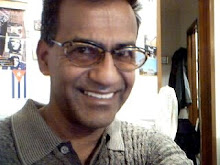
While I take pride in my wide variety of interests, from Morna and Coladera from Cabo Verde to the origins of Chinese Fishing nets in Cochin..I am certainly not a Nutritionist by profession. My Subspecialty of Endocrinology takes pride in understanding the Metabolism of the body. I have great interest in the galloping Obesity and Diabetes epidemic all around the world and of course Nutritionists are not the ones to blame.
Jamie Stang, PhD, MPH, RD, LN, Chair of the Public Health Nutrition Program at the University of Minnesota, School of Public Health, cites some of the dietary challenges faced by the American Indian population. “Limited access to grocery stores that offer low fat, low sugar or whole grain food products and a variety of fruits and vegetables is the most frequently cited barrier to healthy eating…The loss of hunting and fishing rights, unavailability of traditional foods such as wild game, loss of traditional agriculture due to water scarcity and poor soil condition and loss of traditional ways of procuring and preparing foods have also been identified as reasons for poor food choices. Many urban American Indians live in neighborhoods that lack large, well-stocked grocery stores which limits their availability of healthful foods…Even the most culturally competent, evidence-based programs cannot improve eating behaviors among individuals or populations who live and work in an environment that does not support or provide healthy food choice.
The best Nutritionists that I work with among the native people are those self taught Nutritionists who are living within the communities who face the same challenges faced by the patients.
but it is good to know about the incredibly strong tie The American Dietetic Association has with the Food Industry..
Funding Food Science and Nutrition Research: Financial Conflicts and Scientific Integrity. Lots of information is available on this topic on the Internet. Pro and Con. and it is good to have a discourse about it with your colleagues.
If a drug company is paying me $100,000 honorarium for some little work, I dont think I can be realistically be expected to be honest and not biased. In fact, my integrity is in question, when I accept that kind of money, which is not congruous with the expertise or time or actions i am willing to share!
http://www.grist.org/article/bad-dietary-habits/
The above link is a active discussion by patients and citizens and nutritionists and if you have time I recommend you to read it.
Once again, I dont mean to offend any professionals: whether they are Nutritionists or Physician's Assistants. If you are knowledgeable and doing an honest job, you have nothing to worry about! Self Confidence in our professions, whatever they may be, is very important..
I am also a Medical Anthropologist and i have heard more than my share of derogatory remarks from the Native people about Anthropologists but I have never been badly treated by them, and I have always kept their welfare supreme in my endeavours..
PS I read an article on FT Weekend about the lady whose caricature appears above. Believe it or not, she has a PhD in Business Management and she controls a large proportion of what we all eat or long for. Now she is aggressively trying to take over for 10 billion dollars, I think, the chocolate manufacturer, Cadburys.
You can find out who she is ...




